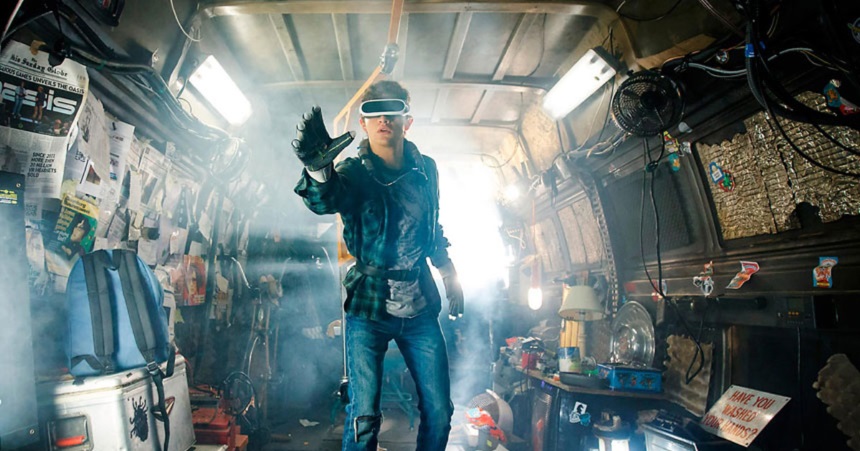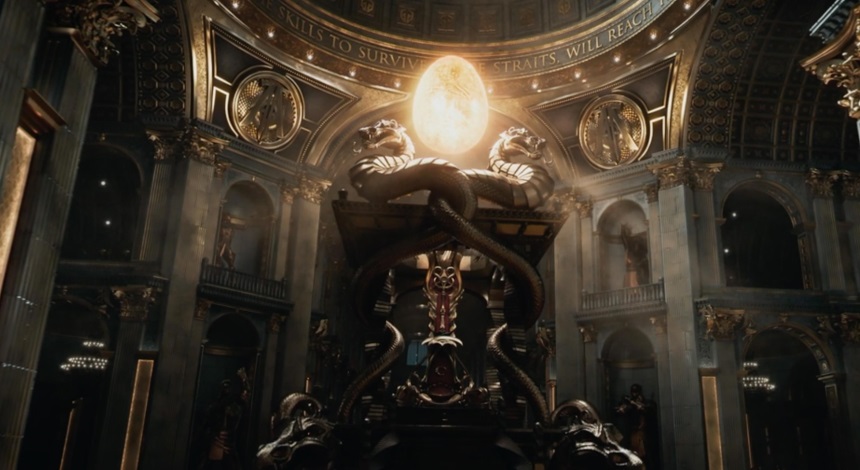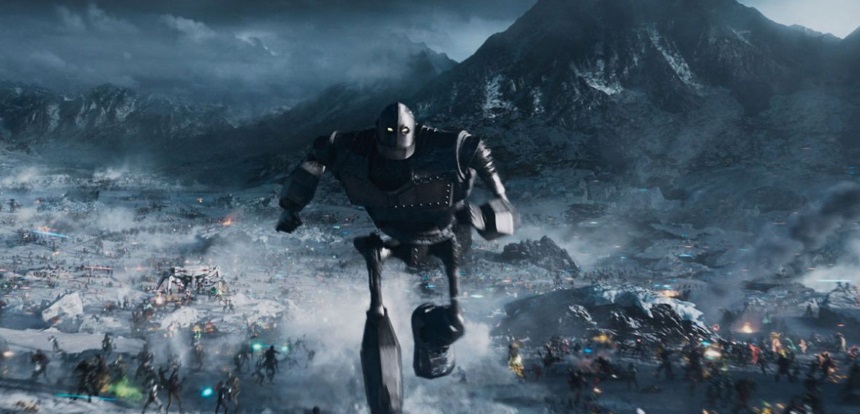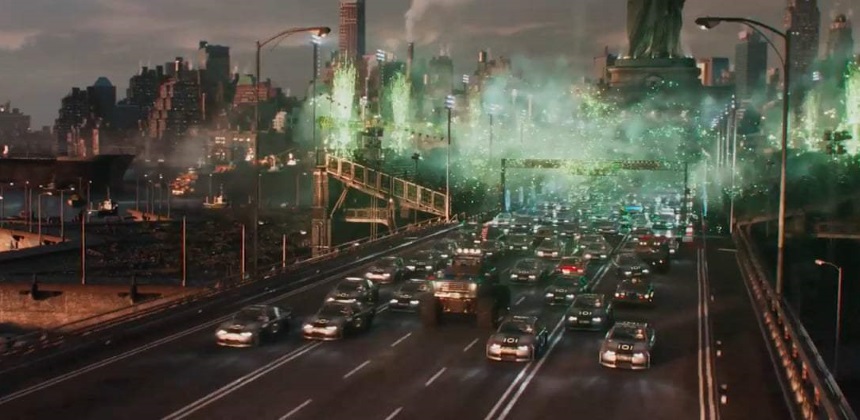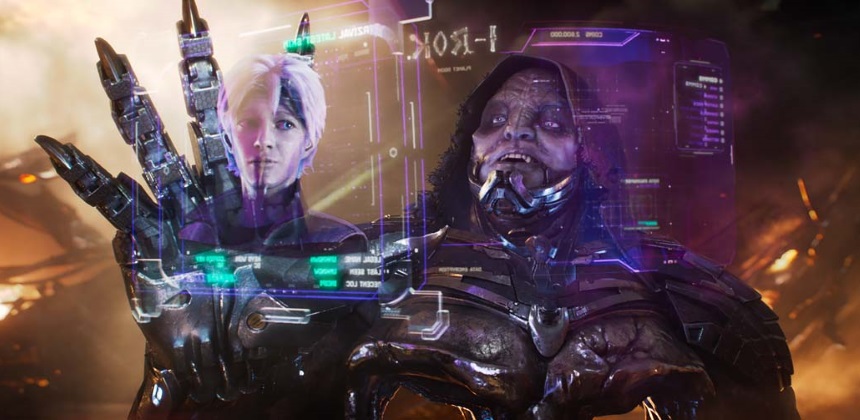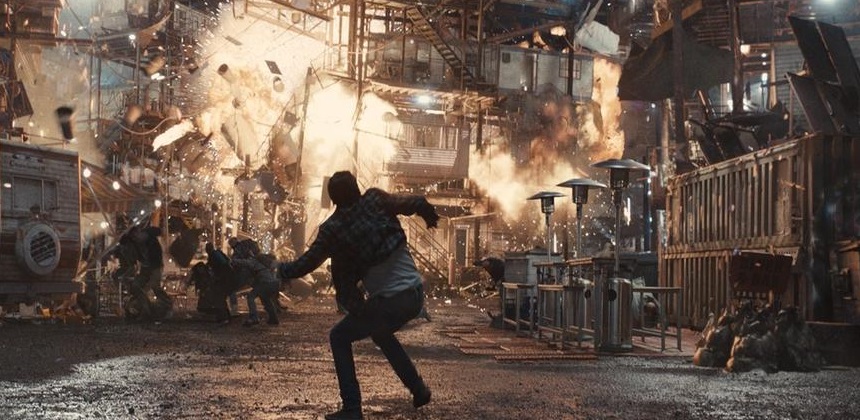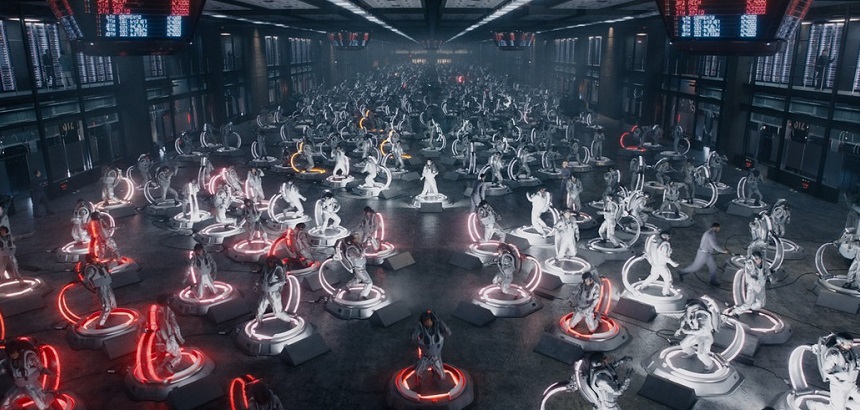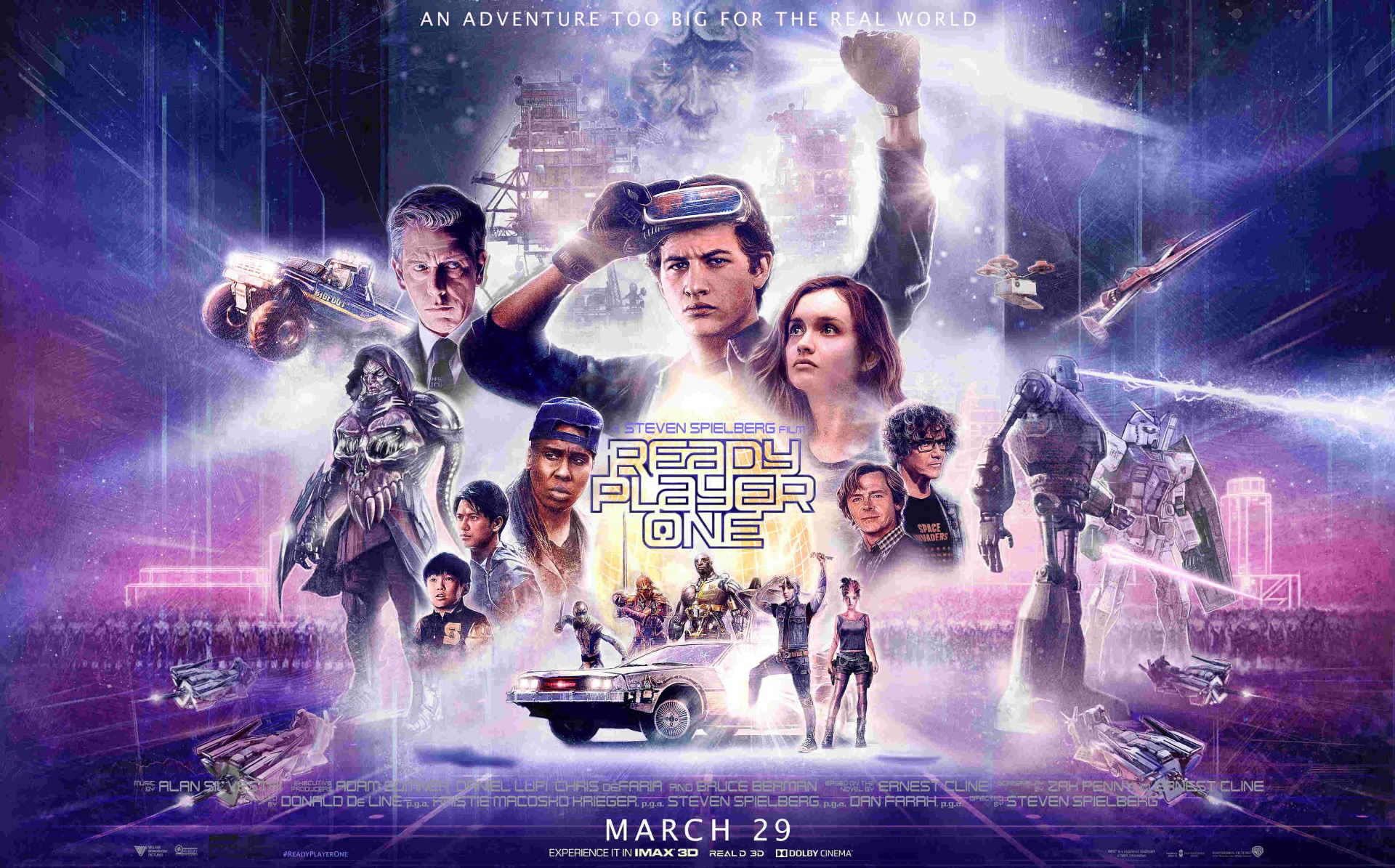
Steven Spielberg's Ready Player One is the legendary director's highest-grossing film in over a decade, and audience reception worldwide is pretty kind towards it. Many critics like the film as well, and some herald it as a return to blockbusting form for Spielberg.
Others were less kind. I have read comments from critics who got angry enough to "never want to see a film again". Whoa!
Therefore, let's check what we here at Screen Anarchy think about the film. Not surprisingly, opinions are mixed here as well.
Tristan Zinampan wrote a positive review, and he is the first one to chime in here with some afterthoughts. Click on the side of each picture to go to the next opinion. Some agree with Tristan, some disagree (and someone even wrote a Haiku). But all opinions are valid, and that includes yours, so please leave your comments about the film for the perusal and enjoyment of us all!
On to Tristan:
Tristan Zinampan, Jim Tudor, Ernesto Zelaya Miñano, Sean Smithson, Ben Umstead, Stuart Muller and Armando Dela Cruz
contributed to this story.









Tristan Zinampan, Contributing Writer
Ready Player One is a frenetic throwback to those classic family-friendly action adventure spectacles of yore. Here Steven Spielberg exhibits his mastery of the blockbuster (a film form he helped create) by elevating the source material through sheer craft and visual awe.
The film's nostalgia pulses not only through its (surprisingly restrained) pop culture references but also via its storytelling. This works as a double-edged sword though as even if its narrative delivers the earnest, wide-eyed entertainment we have sorely missed in blockbusters, characters in the film feel antiquated, lacking nuances. Also, story decisions fall under mere wish fulfillment while their stakes don't carry enough gravity to be felt (e.g., convenient love story, caricaturish and surprisingly incompetent villains).
At the end of the day, even though I find it troubling how the film advocates escapism instead of confronting problems of the real-world head on, I would be lying if I denied the amount of crowd-pleasing fun the film delivers.
Steven Spielberg’s Ready Player One nicely bookends the director’s feature film career (at least until he releases his next film) opposite Jaws with another crowd-pleasing adaptation of a popular book that, let’s face it, is not that well written. The similarities between these two particular films, however, stops there. Based upon the young adult novel by Ernest Cline, Ready Player One tells the story of a poor but resourceful young guy from “The Stacks” (a stacked up trailer park, basically) named Wade Watts (Tye Sheridan). It’s the year 2045, and the world is such a big trashy dump that all anyone cares to do is plug into The Oasis, a hyper-detailed virtual reality game where you can be anything, do anything, and anonymity is guaranteed.
The sweeping establishing shots that introduce The Oasis feel, more than anything else, like the thrown-together pop culture color jumble of a little boy’s Lego box, or the central hub in Wreck-It Ralph. Over here, it’s Batman; over there, it’s Freddy Krueger. Spot RoboCop in this crowd shot, see the A-Team van in that car cluster. It’s all kinds of fun-yet-useless all at the same time. The sheer array of familiar properties that turn up in one way or another is the most staggering thing about the film. One actively wonders how many intellectual property lawyers were employed for this film, and if anyone other than Spielberg could’ve landed this many outside creations.
But, as staggering as it is to take in, the non-stop pop culture references are also the weak spot, in so much as they’re the selling point for both the film and The Oasis itself. In the film, Wade believes Halliday to have arrived at a personal place of regret about having gone so all-in for his beloved movies, TV and video games. (Video game iconography is just as rampant as genre film and TV iconography is, though, not being a gamer, I couldn’t begin to identify them. Spielberg, however, has recently claimed allegiance with gamers. So, be careful when you log onto your Xbox - you might just be battling the director of Schindler’s List). It’s as though Halliday couldn’t ever divorce himself entirely from his love of these things, but he must acknowledge the vapidity of when it becomes a barrage. Ditto Spielberg on that in the making of this movie. Yes, the legendary director is having his cake and eating it too, but he does seem to knows that while he, of all people, may wield the capacity for an unlimited cake budget, there is such a thing as a cake-induced sugar rush.
So, it’s a message movie. Gee whiz. Love the stuff that you love, but don’t forget to look up from it to occasionally kiss the girl. Wade’s Oasis avatar is a sleek manga dude called Parzival who drives the DeLorean from Back to the Future, but modified with a Knight Rider/Glen Larson back-and-forth red light on the grill. Back to the Future, which Spielberg produced for Robert Zemeckis, is one of the only references to his own movies that makes the cut, despite the book utilizing a glut of them. Meanwhile, a time manipulating device in the Oasis is called a “Zemeckis cube”, as though that’s clever. For better or worse, that’s the level Ready Player One is stuck on.
Ernesto Zelaya Miñano, Contributor: Peru
Has Spielberg ever made a truly bad movie? I’m going to go out on a limb and say No. Fight me. Ready Player One is the Almighty Beard letting loose and having fun, while at the same time showing that, even at the age of 71, he’s still a kid at heart, one who hasn’t lost his capacity for wonder and amazement. In a way, this movie makes you feel like a kid playing with toys, the ones you grew up with. Both the movie and the book are nothing more than joyous celebrations of 80s pop culture and general fandom, a blast from the past that made me want to rewatch a whole lot of classics (watching Trading Places in the same week also helped). It’d probably take an infinite number of rewatches - and a sturdy Pause button - to get all the references here (“Is that Doc Brown?”; “Freddy just got blown to bits!”; “Oh shit, Room 237!”), and that’s despite the book getting streamlined. Tye Sheridan and Olivia Cooke make a great pair, and their adventure is fun to follow, but I would have been happy just hanging out in the OASIS for two hours. Gamers, film buffs, comic book geeks (check, check, and check), they’re all well served here; this is a tribute to all that cool stuff that we remember fondly and that which we have yet to discover (“What’s a Glaive?”). And who better to embrace it than Steven Spielberg, who was probably as excited as Parzival to enter the virtual world? Just pure entertainment from a man who makes it look effortless.
Last week I went to see Steven Spielberg's Ready Player One with friends and my kids (aged 9 and 13) and a good time was had by all. The kids loved it, the adults had their moments of fun. My favorite bit is the race.
BUT...
I will never love this film, and the reason is a very simple one: I couldn't help but be constantly reminded of a far better film. The boons of Social networks, the dangers of total connectivity, data power abuse, real-life networking, rallying worldwide on-line troops to battle real-life mortal danger, even the pointy finger about "going outside once in a while", all those things were touched upon in Hosoda Mamoru's Summer Wars, almost ten years ago. And that film basically wipes the floor with this one, on each and every subject. It did that even before the book Ready Player One had been written, and had a better main story as well. To see Spielberg's film be such a tired and unoriginal handling of ideas is disheartening.
I'm OK with all the Easter Eggs, seeing as how the film is about Easter Eggs. But a film which relies on endless referencing as its main draw had better be in the same league as all the films it references, and to me, Ready Player One is not. And Spielberg? I can't tell he is there, somewhere. What little of his magic is in the film is the same shadow endlessly copied by nearly all directors working today.
Still, I wonder... Looking at the screenshots for this article, I see desaturation, where there could have been the brightest of colors, given that this story has a limitless amount of source material available to it. Look at the characters used in the cameos, and compare them to their originals. Everything is seen through very drab glasses. Is that maybe Spielberg's hidden message, his own Easter Egg so to speak? That all the referencing we do nowadays actually takes the color out of things?
Has the old master actually hidden a real message in there somewhere?
On paper Ready Player One seems like a sure thing to become the crown jewel in the current crop of geek-chic, nerd recruiting fare. References and homages to the cherished memories of those of us who grew up on video games, comicbooks, blockbuster (and not so blockbusting) movies, abound and will keep many fandom obsessed viewers in a serotonin soaked fugue state of euphoria.
But, unfortunately, this mega-meta tale of a young man on a quest through a virtual world called the Oasis, to find the keys to unlock and ultimately own the kingdom made by it's now deceased creator, is more concerned with pointing at romanticized references of the past, instead of telling a solid tale of survival, mystery, tribulations, and the friendship and camaraderie that is born of the trials it all brings.
I saw Ready Player One last week, not knowing I'd be throwing in my two cents here about it in a critical sense, so I let the film just wash over me, there for an enjoyment rather than a job, which personally speaking, changes the way I tend to view a film. That said, I now have trouble remembering anything that stood out as concrete in the film. Yes, I liked the The Shining bits, and it was wonderful seeing The Iron Giant get his due, after decades of being the most underrated character in the history of animated films, but Ready Player One overall felt like it was more concerned with the Easter Eggs in it's basket, than the core message in it's narrative. It seems more for people who have seen Alien three or four times then bought the incredibly expensive Hot Toy repro's from the film for their video shelf, rather than having a history of a thousand Saturday nights immersed in watching the actual film over and over and over. It's for the consumerist fan before it is for the fan who engages with the actual material, not the marketing around it.
For an old guard super-geek like myself, the references can become more of a distraction than delicious icing on the cake. I spend more time being a neurotic nerd, constantly connecting the dots, rather than falling into the tale itself. This is also my same issue with the stunt-like casting of Quentin Tarantino, and to a lesser extent, Rob Zombie. Look! It's the dude from that old episode of The Rookies! Oh my God, that's the actress from Starsky and Hutch, where they battle Satanists while on a fishing vacation!
Switch in nods to old games, movies, etc, and you have Ready Player One, which to say again as succinctly as I can, seems more for consumerists and what I call "gatecrashers", the new breed of fan that is suckered by every marketing ploy and buys into whatever little creature is going to be seen in two years in the new Star Wars film, before letting it just "happen" and falling in love with something after having actually seen it. It's as prefab as the Oasis, the limitless VR world where we spend most of our time in Ready Player One.
Is the film fun? For me, it was fun enough, but it was also like cotton candy. Once you bite into it, you quickly find, after the sugar dissolves, there's really not a lot, if anything at all, there.
Steven Spielberg’s adaptation of Ernest Cline’s nostalgia driven novel is his best film in over a decade. There, I said it. Indeed, it is the Beardy Berg's best since Munich — which was one of the rare circumstances where maudlin Spielberg worked. Because as many of us know, he’s an populist entertainer of the highest order and Ready Player One is one heck of another tightly made blockbuster. But what does that really mean in this day and age?
As the months go on and the think pieces roll in, I’ll be curious to see how audiences and critics alike take the film in a world post gamergate. Any work made by older white men will clearly have a lot to live up to for the more progressive humans looking beyond the status quo of sex, politics and money. Considering that, Spielberg acts as a bridge to help heal the rift. After Black Panther and neo-Star Wars there really is no argument left or need for, white male heroes to be in these generally gender neutral myths as the default. But this film isn’t as shy about life outside a cis hetero world as those others. Really, major points for having an 11-year old’s avatar be an androgynous ninja and the black lesbian acting both as a meca-orc and iron giant).
As a popcorn flick RPO does it better than nearly any other contemporary effort on a similar scale (Fury Road may be the only other comparison, interestingly a post-apocalypse flick while RPO is an apocalypse blocker of sorts). And because Spielberg helped usher in so much of what the virtual Oasis of the film is built up around, it makes perfect sense in our flood of nostalgic feelings that Steven ‘fuckin’ Spielberg went and made a film that closes the circle, using such nostalgia as a tool for some sharp satire (tonally RPO falls closer to Robocop and Starship Troopers than you might expect) and ultimately opts for cooperation over winning or losing. But it’s more than just the geeks inheriting the earth. It takes compassion to heal a broken world. Glad this one (albeit with a few irksome feelings I have around police authority in the film) leans on the side of a future that is human being, rather than of mankind.
A sorta side note: The whole design of this world feels oh so close to our own future, more than say a William Gibson or Paulo Bacagilupi story simply because it takes what happened with World of Warcraft and multiplies it by 1000000. Except, the film’s universe seemingly doesn’t have a Google, Apple, Facebook , Amazon or Disney and ours has all of them. As Gozer states in Ghostbusters: “Choose and perish!”. My bet is on Disney (if not all five of ‘em?)
Stuart Muller, Contributing Writer
Ready Player Fun!
Insubstantially substant
Nostalgia Soulja.
Armando Dela Cruz, Contributing Writer
Go tell Alexandra Robbins: the geeks have inherited the earth. The year is 2045---just four years before Ryan Gosling gets on it with his A.I. girlfriend in Blade Runner 2049; is that an easter egg?---and the world is in shambles. The real world, that is. The economy is at an all-time low, the earth itself sore with telluric problems, barely surviving. And rather than tend to its grave plights, the world plugs itself into another world where there’s none. The geeks should not have inherited the earth.
In Steven Spielberg’s new film Ready Player One, you, your parents, your friends, your neighbors, and your titos and titas are hooked to a virtual Neverland called the Oasis, where it’s sunnier than Philadelphia where it’s already always sunny. Switch genders, descend to the earth as a Gundam mecha, or take a hike...with Batman---you can do literally anything and everything. Why bother about the outside world, when all is possible for you in the Oasis (granted that you have the “credits” to blow)? Why go back to the despairing corners of Wendy’s bedroom when you can hang out with Peter Pan?
That's about as much intrigue Spielberg will milk out of a universe sorely tethered to the idea of escape, which, specific to his film, comes in humanity's gradual decay to their respective digital copies. It's doubtful Spielberg wishes to repeat himself on this front after mounting such a beautiful discussion of the matter in his 2001 film, A.I.: Artificial Intelligence, and the appeal to the dynamic between Halliday and Wade is anyway more potent than those to their individual characters and the film’s begrudging critique on crashing adrift the film’s Pompeii of all manners of multimedia escape---the ultimate suburbia.
Spielberg folds all that into the cluster-pop batter of Ready Player One, a precious love letter from a creator about the true and false value of his work, lost in the haze of blockbuster chaos. Each set piece and the next is a hyperstimulation of 80’s nostalgia and prized pop culture in a blink-or-you’ll definitely-miss-it fashion designed to make viewers puke glitter or roll their heads over.
Read my full review over at Unreel.

More about Ready Player One
More about Have Your Say
Around the Internet
Recent Posts
Leading Voices in Global Cinema
- Peter Martin, Dallas, Texas
- Managing Editor
- Andrew Mack, Toronto, Canada
- Editor, News
- Ard Vijn, Rotterdam, The Netherlands
- Editor, Europe
- Benjamin Umstead, Los Angeles, California
- Editor, U.S.
- J Hurtado, Dallas, Texas
- Editor, U.S.
- James Marsh, Hong Kong, China
- Editor, Asia
- Michele "Izzy" Galgana, New England
- Editor, U.S.
- Ryland Aldrich, Los Angeles, California
- Editor, Festivals
- Shelagh Rowan-Legg
- Editor, Canada


